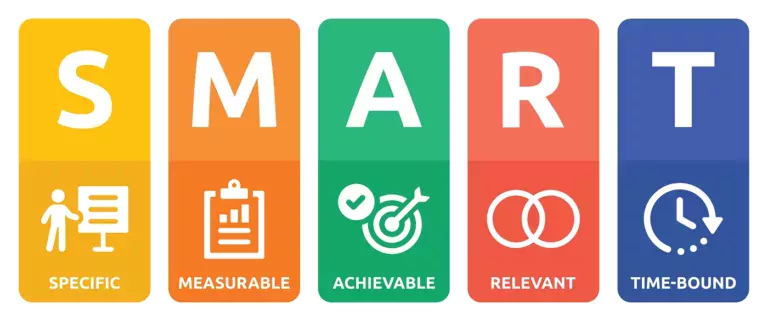Reflecting on the past year, you may be realizing that many of the goals you set weren’t achieved. To avoid a repeat next year, I’ll equip you with tools to set clear, actionable goals for 2024 using the SMART method.
What if I didn’t hit my goals this year?
As the year wraps up, it’s common to reflect on unmet goals and experiences. Whether it’s the unused gym membership or a lingering breakup, now is the time to intentionally shape the upcoming year. If you haven’t laid the groundwork for your goals, time can slip away, leaving you in June without progress. Instead of dwelling on the past, focus on building a new foundation. Think about what you want to see in yourself or your environment next year, and gather the elements to start the new year on the right footing. Don’t wallow in spilled milk; focus on getting a new cow. A straightforward step is to implement SMART goals.
How do you set SMART goals?
Goal setting is crucial for personal and professional growth, and SMART goals offer a recognized framework. SMART stands for Specific, Measurable, Achievable, Relevant, and Time-bound. This structured approach ensures clear, motivating, and accountable goal-setting. Let’s explore each element and provide examples for practical application.
Specific
Specificity is key in SMART goals. A specific goal is clear and leaves no room for ambiguity. Ask yourself: What exactly do you want to accomplish? Why is it important? Who is involved? Where will it happen? What are the constraints or requirements?
Example:
- Vague Goal: “I want to get in shape.”
- Specific Goal: “I want to lose 15 pounds by running for 30 minutes five days a week and following a balanced diet for the next six months to improve my overall health and fitness.”
Measurable
Measurability is essential for tracking progress and determining success. Measurable goals quantify objectives and answer questions like: How much progress do you aim to make? How will you know when you have reached your goal?
Example:
- Non-Measurable Goal: “I want to communicate more with my family.”
- Measurable Goal: “I want to call my mother once per week and have at least a 15-minute conversation with her.”
Side note: If you are looking to strengthen your communication, check out Dr. Monica Johnson’s episode on the communication killers robbing you of good relationships. Listen here as you read:
Achievable
An achievable goal is realistic given your resources, skills, and constraints. Striking a balance between challenge and attainability is crucial to prevent frustration.
Example:
- Unachievable Goal: “I want to become a billionaire within a year, starting with no capital.”
- Achievable Goal: “I want to save $5,000 in the next 12 months by reducing unnecessary expenses and increasing my monthly savings.”
Relevant
Relevance ensures your goals align with broader objectives and values. A relevant goal should contribute to your personal values or goals.
Example:
- Irrelevant Goal: “I want to become a professional content creator while pursuing a career in accounting.”
- Relevant Goal: “I want to complete a certification in financial accounting within the next six months to advance my career in accounting.”
Time-bound
Time-bound goals have a specific deadline, providing urgency and preventing procrastination. Setting deadlines allows progress monitoring and strategy adjustments.
Example:
- Open-Ended Goal: “I want to learn a new language.”
- Time-bound Goal: “I want to achieve conversational fluency in Spanish within one year by taking weekly lessons and practicing for at least 30 minutes every day.”
Do you have goals at work? Another QDT podcast, Modern Mentor dug into how to check in on those goals at different times to make the year a success. Listen in this app while you read on:
How can SMART goals help you succeed?
SMART goals offer a powerful framework for effective goal-setting, applicable in various life areas. By making goals Specific, Measurable, Achievable, Relevant, and Time-bound, individuals enhance clarity, motivation, and accountability in pursuing their objectives. Whether you’re a productivity maven or exploring leisure goals, consider implementing SMART goals for a meaningful year. Take some time to think about your goals, jot down associated SMART goals, and prepare for a meaningful year!
Disclaimer
All content here is for informational purposes only. This content does not replace the professional judgment of your own mental health provider. Please consult a licensed mental health professional for all individual questions and issues.




